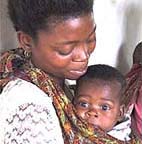|
||||

|
|
||||
|
Wednesday, 20 September 2000 PRESS RELEASE
GLOBAL VACCINE FUND COMMITS $150 MILLION IN VACCINES AND FUNDING OVER FIVE YEARS TO 13 DEVELOPING COUNTRIES Initial effort will reach four
million children, save more than 100,000 lives per year;
GENEVA, 20 September — The Vaccine Fund for Children’s Vaccines will give more than US$150 million worth of vaccines and funding over five years to improve immunization programs in Africa, Asia, and Latin America. Thirteen countries will receive the first awards — Cambodia, Côte d’Ivoire, Ghana, Guyana, Kenya, the Kyrgyz Republic, Laos, Madagascar, Malawi, Mali, Mozambique, Rwanda, and Tanzania. As a result, these countries will be able to immunize four million children against hepatitis B by the end of 2001, and more than 600,000 children who would not otherwise have received any immunizations will now be protected. This represents a 10% increase in basic immunization coverage. According to estimates, more than 100,000 lives will be saved every year due to these initial grants. "Never before have we been able to provide this level of assistance directly to countries in such a short time. That is important because immunization is one of our most cost-effective public health interventions. Vaccines clearly save lives and it is unacceptable that 30 million children today are not fully vaccinated", said World Health Organization (WHO) Director-General Dr. Gro Harlem Brundtland, chair of the board of the Global Alliance for Vaccines and Immunization (GAVI), a coalition of public and private institutions. "The Vaccine Fund is one of a handful of financial tools being used to help reverse declining immunization rates and to speed introduction of new and under-used vaccines in the world’s poorest countries." "GAVI is the kind of innovative partnership we need to bring vaccines to the children who need them most — and to demonstrate to industry that if they develop vaccines for the poorest countries, we will help pay for them. That is why I have asked the Congress to invest $50 million this year in the Vaccine Fund for Children's Vaccines to support GAVI’s work", said U.S. President Bill Clinton. The Vaccine Fund award process is designed to efficiently channel resources to developing country health systems. Approximately 98% of current Global Fund resources will go directly to national immunization programs. Thirty more countries are expected to submit proposals to the Vaccine Fund for the next review in October; subsequent reviews have been scheduled throughout 2001 and early 2002. The intention is to provide some form of support to all 74 eligible countries — those with income of less than $1,000 GNP per capita — over the next two years. "This new approach — issuing an open call to eligible countries and asking them to design improved immunization programs based on local needs and conditions — is clearly resonating among donors and developing country officials", said Carol Bellamy, Executive Director of UNICEF, and a member of the GAVI Board. Countries will receive financial and technical assistance either to strengthen basic immunization systems or to introduce newer, under-used vaccines such as hepatitis B and Haemophilus influenzae type b (Hib). Some countries will receive support in both areas. Initial grants of vaccines and funding are made based on a careful review of the country applications, which require comprehensive five-year plans demonstrating increased government investment (and decreased external aid) over time. Subsequent grants will be made depending on the country’s ability to implement the plan and meet its goals. "The availability of resources from the Vaccine Fund is giving health officials the opportunity to critically assess their current programs and identify more collaborative, sustainable approaches to integrating immunization activities in their health services", said Jacques-François Martin, President of the Vaccine Fund. "This is exactly what we were striving for — to see that more children are fully immunized and health systems improve in the process." At present, vaccines save about three million children per year. However, GAVI estimates that another three million die for lack of immunization. For example, measles, virtually unseen in rich countries today, kills nearly one million children every year and pneumonia and meningitis caused by Hib take another 400,000 young lives annually. The Vaccine Fund was launched earlier this year with an initial contribution of $750 million from the Bill & Melinda Gates Foundation. To date it has secured nearly $200 million in additional commitments from Norway, the United States, and the United Kingdom. Other governments, including the Netherlands and Canada, have also expressed interest in contributing to the Vaccine Fund. The Vaccine Fund for Children's Vaccines provides financial support directly to low-income countries to strengthen their immunization services and to purchase new and under-used vaccines. In the future, Global Fund resources may also be used to accelerate the development of vaccines for diseases responsible for significant mortality in developing countries, such as HIV/AIDS, tuberculosis, malaria, and acute respiratory diseases. While the Vaccine Fund has its own Board and management for fiduciary and fundraising responsibilities, recommendations about programs to receive support will be made by GAVI. The Global Alliance for Vaccines and Immunization (GAVI) is a coalition of organizations formed in 1999 in response to stagnating global immunization rates and widening disparities in vaccine access among industrialized and developing countries. The GAVI partners include: national governments, the Bill and Melinda Gates Children's Vaccine Program, the International Federation of Pharmaceutical Manufacturers Associations (IFPMA), research and public health institutions, the Rockefeller Foundation, the United Nations Children's Fund (UNICEF), the World Bank Group and the World Health Organization (WHO). October 2000: Detail of first disbursements from The Vaccine Fund (see Table)
|
||||
| Contact GAVI | Guestbook | Text version | Credits and Copyright | ||||
